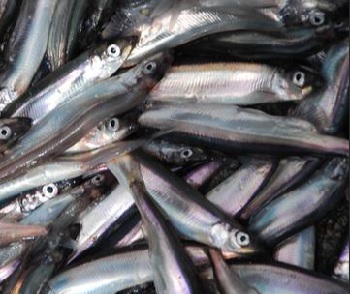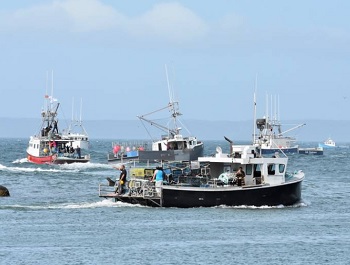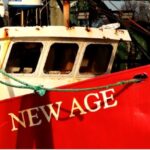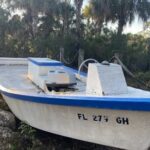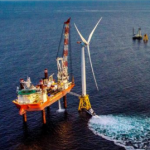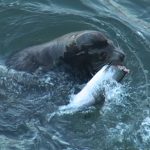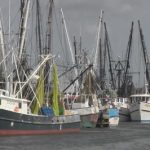Tag Archives: Department of Fisheries and Oceans
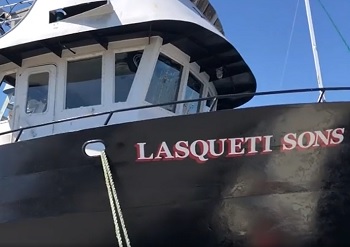
Vancouver Island fishermen upset after sudden salmon fishing closures
Bill Forbes and his crew geared up in French Creek to go salmon fishing. Forbes and his crew, who are heading to a spot near Prince Rupert, are one of the few commercial fisheries still open following a sudden and massive closure by the Department of Fisheries and Oceans on June 29. “They can’t keep blaming the commercial fishermen, we may be part of the problem but kicking us out is not the solution,” said fisherman Bill Forbes. “It throws this boat and all my crew, I’ve got three generations of Forbes’ on this boat and it just puts us out of work. I’m old but you know my grandson and my nephew are not. So they have to go someplace else and I don’t know where that someplace else is,” Video, >click to read< 08:54
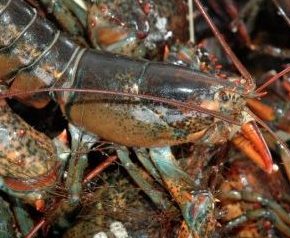
DFO seized and released hundreds of short lobster from a First Nations vessel in Cape Breton
DFO said enforcement officers inspected a vessel Tuesday night in St. Peters canal operating under a communal food, social and ceremonial licence. The lobsters were released that night. Noel d’Entremont, acting director of conservation and protection in the Maritimes region, said no charges have been laid, but an investigation is continuing. A portion of the incident was captured on video and posted to social media showing lobsters being tossed back in the water by DFO officers. The FSC licence being fished was for a Cape Breton band, which DFO declined to identify. >click to read< 17:07

Prospect area mackerel fishermen demand answers after lucrative season halted by DFO
The fishermen were prepared to set up a roadblock if they didn’t hear back from the Department of Fisheries and Oceans about why the season was halted. While most commercial fisheries for Atlantic mackerel have not started for 2021, a number of fisheries in the Maritimes region are open year-round or opened on April 1.,, DFO issued a variation order to temporarily close the Maritimes region mackerel fishery. About 72 fishermen and their crew from the Prospect area who fish and set traps in St. Maragaret’s Bay are affected by the closure. They say there is mackerel in the waters but they aren’t allowed to pull in their nets because they haven’t been given their quota. video, >click to read< 10:29
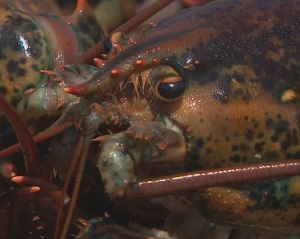
Members of Parliament issue conflicting reports on contentious Moderate Livelihood fishery in Quebec in the Maritimes
Parliamentarians issued dissenting reports Thursday on implementing First Nations moderate livelihood fisheries,,, Although all parties supported the right to a moderate livelihood fishery, the committee was not unanimous. Both the Conservatives and Bloc Quebecois issued dissenting reports. The Conservatives consider moderate livelihood fishing a commercial enterprise and subject to the same regulations, including seasons, as all commercial fisheries, with enforcement and regulation unambiguously under the Department of Fisheries and Oceans. The Bloc called for co-management. The office of federal Fisheries Minister Bernadette Jordan issued a statement Thursday that said it had received the report that morning and “look forward to reviewing its recommendations closely.” >click to read< 16:09

Seafood wholesaler, boat master fined for obstruction
The fines resulted from what DFO describes as “a serious case of obstruction,” which included the co-owner of the wholesaler eating a receipt rather than give it to a DFO officer. A B.C. provincial court judge has found Tenshi Seafood Ltd. and the company’s co-owner, Dishi Liu, guilty of violating the Fishers Act. The company was fined $75,000; Liu was fined $25,000. The judge also handed a $10,000 fine to Thuong Nguyen, master of the commercial fishing vessel Dream Chaser, for obstructing a fisheries officer. >click to read< 17:47

Scientists, First Nations team up in fresh attempt to revive struggling B.C. herring stocks
For decades, the fish were viewed as a virtually inexhaustible resource. They were canned, frozen, used as fertilizer, and even rendered into slippery goo to grease logs being skidded out of the forest. But the once coastal-wide bonanza is fizzling out. This year, most of the waters off B.C. were closed to commercial herring boats, with the only quota being allowed in the Strait of Georgia, along Canada’s southwest coast. The first collapse of the stocks happened in the 1960s, due to overfishing. They were allowed to recover but have had ups and downs in recent decades. The herring fishery in Eastern Canada has also been facing tough times. >click to read< 13:48
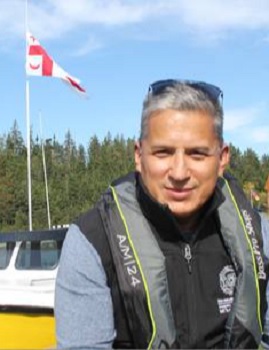
Cape Breton First Nation’s plan for early fishing forced hand on new regulations
A spokesperson for DFO says the department was preparing the new regulations for the early May start to the commercial lobster fishing season, but was rushed into action by Potlotek First Nation’s plan to start fishing in mid-March. “We can’t have what happened last year in St. Peter’s Bay, where there was a fishery plan for combined Eskasoni and Potlotek for about 1,000 traps and we saw almost three times that in the water. We can’t have that again, it’s not sustainable,” said DFO spokesperson Jane Deeks. Chief Wilbert Marshall strongly denies that claim. In her statement, Jordan cites Marshall II, the amendment made to the Supreme Court Marshall decision that allows for treaty rights to be regulated on the grounds of conservation. >click to read< 18:42
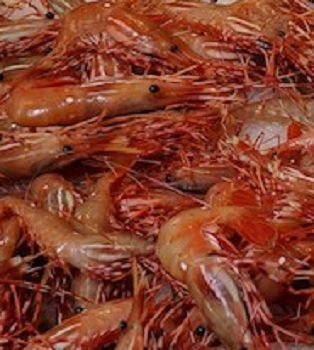
B.C. frozen-at-sea spot prawns would be illegal – could be off the market
An interpretation of a new ruling by the DFO, would find the sale of any spot prawns frozen-at-sea illegal. The ruling, as written, indicates the following: “No person who catches and retains a fish under the authority of a license issued for the purpose of commercial fishing shall have the fish in possession if the fish is skinned, cut, packed or otherwise dealt with in such a manner that […] where size limits are applicable, the size of the fish cannot be readily determined.” That means tubs of frozen-at-sea spot prawn tails could be off the market. Members of the industry are asking for public support in challenging the decision, supporting B.C. harvesters, and giving consumers the ability to continue the movement to access Canadian prawns and eat locally. >click to read< 08:49

P.E.I. Mi’kmaw chiefs denounce DFO’s ‘moderate livelihood’ fishery plan
A news release from P.E.I.’s Mi’kmaw chiefs Thursday called the plan “both unlawful and disrespectful.” “DFO’s continued paternalistic approach to our rights-based fishery goes against the very spirit of reconciliation,” Abegweit First Nation Chief Junior Gould said in the release. Lennox Island First Nation Chief Darlene Bernard said she was “blindsided” by Fisheries Minister Bernadette Jordan’s announcement, especially since she had taken part in a roundtable discussion with Jordan Wednesday during which they talked about the moderate livelihood fishery. >click to read< 09:36
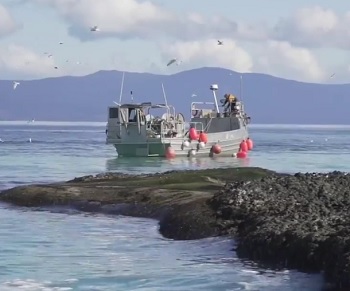
Strait of Georgia: DFO sets herring fishing quota at 20 per cent, cons call for ban
Herring fishermen Quincy Sample in Comox look forward to being back on the water after the Department of Fisheries and Oceans announced a 20 per cent harvest rate for this year’s return in the Strait of Georgia. For Sample and many others, it’s an important part of their livelihoods. “It’s a very important part of our year,” said Sample. “It supplies a good income for us, our families, and our deckhand’s families. It probably accounts for 35-40 per cent of my overall year.” >click to read< 09:15
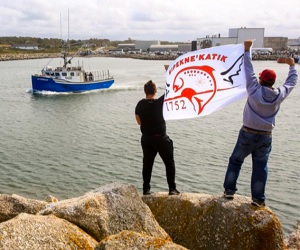
‘The Crown’s honour is at stake’:Indigenous chief makes appeal to Justin Trudeau as fisheries deal rejected
A first draft memorandum of understanding was sent by the Department of Fisheries and Oceans to the Sipekne’katik last week,,, The proposal, which was received with optimism, included the capacity for the Sipekne’katik to legally sell its moderate livelihood catch, which has been problematic for the band. But according to Chief Mike Sack, the government offer fell far short of what he had expected, In an open letter to Prime Minister Justin Trudeau on Friday, Sack wrote: “Although we had tempered our response of this first draft as a potentially groundbreaking and historical understanding, Sipekne’katik remains very disappointed in the draft documents’ intent and content.” “The Crown’s honour is at stake, >click to read< 18:47
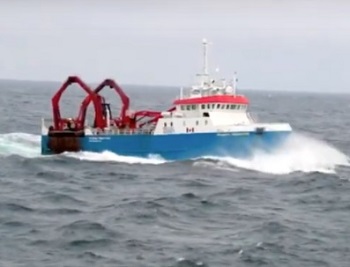
Independent inshore lobster fishermen fear the Clearwater purchase could decimate their livelihoods
In 2018, then-Minister of Fisheries and Oceans, Dominic Leblanc, put an end to Clearwater’s 20-year monopoly on the lucrative offshore fishery of Arctic surf clam when he allocated a quarter of the clam quota to the Five Nations Clam Company,,, Clearwater threatened legal action over the deal, and after it emerged that LeBlanc had family ties to Premium Seafoods, the plan was cancelled. Clearwater regained its surf clam monopoly for a year. Then in 2020, just nine days before Sipekne’katik First Nation launched its moderate livelihood fishery in Saulnierville in Southwest Nova, Clearwater announced that Membertou First Nation had purchased two of its eight licences for offshore lobster, over which the company had a monopoly,,, >click to read< Search Results for: Five Nations Clam Company, (lots )>click here< 20:56

Canada contemplating new Aquaculture Act
The Canadian government has started a public consultation process to help develop an Aquaculture Act. In a discussion paper on its website, DFO said the proposed Aquaculture Act would define in Canadian federal law — some for the first time — the many aspects of aquaculture, including definitions of aquatic species and the practice of aquaculture itself. “It is proposed that the Act would also be forward-looking by being inclusive of emerging aquatic species for cultivation, as well as enabling aquaculture in Canadian offshore waters.” >click to read< 11:38

“Mixed Feelings”: Sipekne’katik chief says discussions with commercial fishers in Nova Scotia can wait
Responding to Ottawa’s decision to name Allister Surette as a facilitator in the dispute, Sipekne’katik Chief Mike Sack said he had “mixed feelings.” He said that while he was not fundamentally opposed to participating in the process, “right now, we’re not worried about that.” Surette, president and vice-chancellor of Université Sainte-Anne who has experience as a facilitator in fishery disputes, was named to the role on Friday. Surette said his work might lead to a resolution in the fishery dispute,,, Sack, however, maintained that the resolution lies in his band’s talks with the federal government, not with commercial fishers. >click to read< 16:00
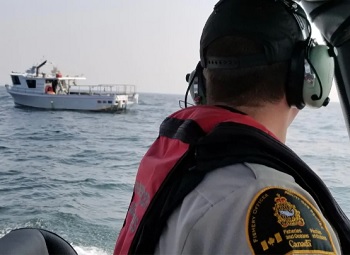
Fisheries officials seize 316 Canadian crab traps set in U.S. water, along with four vessels as part of annual sting
“You have people who push the envelope because it may be worth it for them to do that if they don’t get caught, because there’s money in crab — there’s good money in crab,” he said. “Sometimes getting caught and getting fines may be the price of doing business.” Demsky estimates each set of gear — including a trap, float, ropes and radio frequency ID chip — would cost about $500 to replace. DFO will seek the forfeiture of all of them, and the courts will decide whether the fishers will face fines, the loss of their fishing license or vessels. The fines are often several thousand dollars, but can to go a maximum of $500,000 for a first-time offender, according to Demsky. >click to read< 08:10
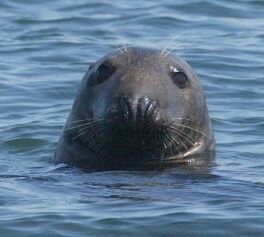
DFO working to keep U.S. markets open to northern fisheries
The Department of Fisheries and Oceans is working to ensure that fisheries in Nunavut and Nunavik will be able to export their products to markets in the United States after next year. Beginning on Jan. 1, 2022, the U.S. Marine Mammal Protection Act’s import provisions rule will take effect. Four Greenland halibut (turbot), three Arctic char fisheries, and a shrimp fishery will all need to comply. “This rule ensures that the U.S. will only accept imports of fish and fish products originating from foreign countries that have enacted management measures to reduce marine mammal bycatch”,,, DFO submitted a progress report to NOAA and proposed that three Arctic char gillnet fisheries be exempt based on their location in river estuaries, short time in the water and shallow depth. NOAA rejected the request for an exemption. >click to read< 14:00
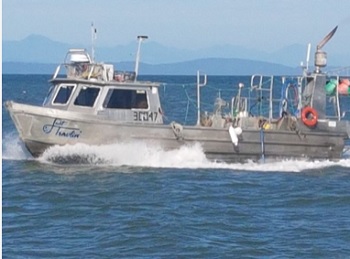
British Columbia: Steveston-based fisher says industry faces uncertain future amid Coronavirus
Some B.C. fishers may be forced out of the industry if they aren’t able to earn enough income this year, according to Steveston-based fisherman Justin Taylor. As domestic and foreign demand fell dramatically in the wake of COVID-19, processing plants, which fishers directly supply, haven’t been able to sell to the restaurants and hotels that normally make up the bulk of the seafood market. As a result, prices are uncertain, and lower. “This is going to be a survival year for me and my crew, for sure,” he said. “When you’re facing 40 to 50 per cent price reductions, you really don’t know after expenses if there’s going to be much money actually pocketed…There’s a real risk of not making any money.” >click to read< 22:08
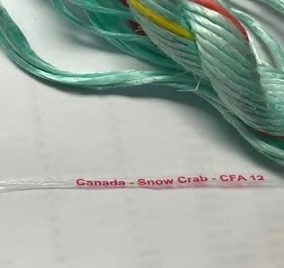
P.E.I. fishermen adjust to newly imposed gear markings
The P.E.I. Fisherman’s Association said it’s receiving calls from local fishermen asking for clarification over the new gear markings imposed by the Department of Fisheries and Oceans. Like any new management measure, Griffin said, it will take time to get used to. “Prior to this there were no gear markings,” she said. “It’s a brand new … management measure in place, so there’s always a little bit confusion when a new management measure comes in,” Griffin said. To reflect the United States Marine Mammal Protection Act, fixed gear fishermen on P.E.I. will now be required to have specially-coloured fishing gear rope. One piece to represent the Gulf region, one to represent the species they are fishing and one to represent the location of their trap. >click to read< 11:48
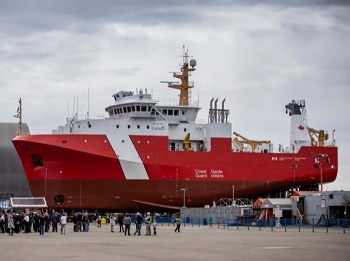
Rising costs drain contingency fund for Canada’s new fisheries science ships
According to a memorandum prepared for Jonathan Wilkinson, the former minister of fisheries and oceans, the project had already used $19 million in contingency funds by May 2019. But more was needed, the memo said, to cover “escalating project costs such as labour rates and owner’s changes, as well as other unexpected increases to project costs including transition into service costs.” “Access to the remainder of the contingency funding [redacted] is now required,” the two-page memo said. >click to read< 10:21

Nova Scotia communities await decision on contentious pulp mill pipeline
Allan MacCarthy, a fisherman based in Pictou County, said fishermen remain convinced the effluent would pose a threat to lobster, crab, herring and other species in the strait over time. His protests landed him in court last year when a temporary injunction was imposed ordering him to stop blocking survey activities by the company. “Until the minister announces it (the decision), there’s not much we can do. >click to read< 08:04

Canada: Government conflict of interest a threat to fish biodiversity: scientists
Canada has made disappointingly little progress in preserving the variety of life in its oceans largely because of a contradiction in the federal department that’s supposed to protect it, says a group of senior scientists. “The (Department of Fisheries and Oceans) is charged with conflicting responsibilities,” said Jeff Hutchings, a marine biologist at Dalhousie University in Nova Scotia. “On the one hand, they’re there to protect and conserve. On the other hand, they are charged with the responsibility of exploiting fish stocks.” >click to read< 08:40
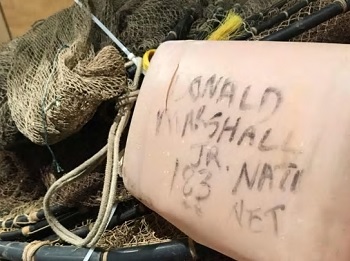
A potent symbol of First Nations rights sat for years in DFO storage, but now it’s home
Jeff Ward was in the middle of a meeting last month in Truro, N.S., when he received a text that made him jump out of his chair.,, Sent to him was a photo of Donald Marshall Jr.’s eel nets, the same ones seized more than two decades ago when the Mi’kmaw man was charged with fisheries offences, a case that would reshape First Nations fisheries in Atlantic Canada. >click to read< 19:21
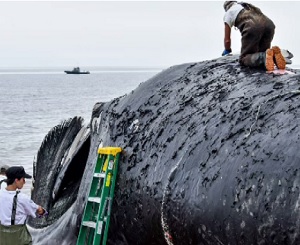
Necropsy on third North Atlantic right whale shows evidence of blunt trauma
Preliminary findings from the third necropsy of a 33-year-old right whale — named Comet – show evidence which is highly compatible with death due to blunt force, consistent with vessel strikes. Canadian conservationists are calling the death of a sixth North Atlantic right whale that was found last week devastating. >click to read< 11:52
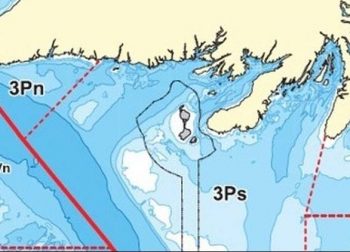
South coast Newfoundland fishers angered by short notice on closure of 3Ps cod fishery
Ross Durnford of Fortune has seven deep freezers powered up to keep 1,000 pounds of bait frozen until next cod fishing season, after the Department of Fisheries and Oceans (DFO) shut down the cod fishery in his fishing zone. Durnford had 10 tubs of cod fishing gear baited up and ready to drop in the water, but the early closure of the fishery in zone 3Ps — on the south coast of Newfoundland — forced him to cancel his plans. >click to read< 11:19
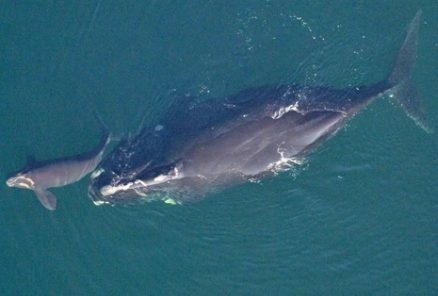
All right whales survived visit to Canadian waters last year
No North Atlantic right whales died in Canadian waters in 2018, so protective measures will continue, a Fisheries spokesperson says. The year free of deaths means the protective measures implemented last year are working, said Adam Burns, director general for fisheries resource management with Department of Fisheries and Oceans. “In 2018 there were at least as many North Atlantic right whales in the southern Gulf of St. Lawrence as there were in 2017, when we had all of those incidents, and we continued to have fishing activity in those same areas,” Burns said. In 2017, the death toll came to 18. Twelve of the whales died in Canadian waters. >click to read<14:17

NewBrunswick: Some go home with more money in their pockets, some less, as fishing season ends
Lobster and crab fishermen in northern New Brunswick are removing their gear from the water Friday, as the season draws to a close. Saturday marks the official end to what fishermen described as a roller-coaster season in the Acadian Peninsula. All areas close to fishing on June 30, except for Neguac and Burnt Church, where the lobster season was extended until July 2. There were outcries and protests from the fishing community throughout the season, over new measures imposed by the federal government to protect endangered north Atlantic right whales, after a historically deadly summer. At the end of this eventful season, the feelings are mixed. >click to read<12:39
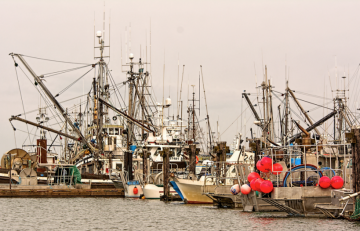
Pacific Salmon Treaty 3.0 looms for B.C. fishing industry
It has been nearly 20 years since a renegotiation of the Pacific Salmon Treaty with the U.S. sparked a war between the B.C. government, Ottawa and the U.S. That fight ended with Ottawa trying to expropriate a provincially owned seabed at Nanoose Bay – used for a joint Canadian-American submarine and torpedo test range – and generated such hostility that angry B.C. fishermen corralled an American ferry and held it hostage for two days in Prince Rupert in 1997.,,, The treaty expires at the end of this year. American and Canadian negotiators have been quietly working on its renewal for 18 months, said Brian Riddell, who is a Canadian commissioner to the Pacific Salmon Commission. >click to read<18:49
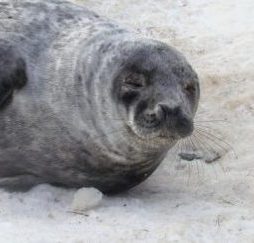
Call for Increased Seal Hunt as Population Surges
Hungry East Coast seal populations have surged in recent decades, spurring calls for an increased seal hunt — and even a possible cull — to protect fragile caplin and northern cod stocks. The Northwest Atlantic harp seal population is estimated at about 7.4 million animals — almost six times what it was in the 1970s, according to the federal Department of Fisheries and Oceans. Grey seal numbers in the Gulf of St. Lawrence have grown from about 5,000 animals in 1960 to an estimated 98,000 in 2014, according to the department. >click to read<16:04






